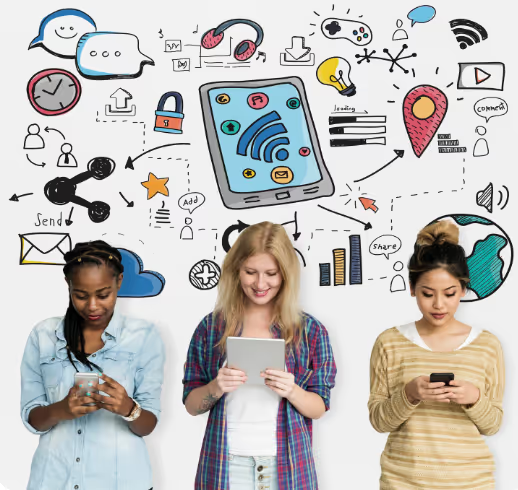Stay informed with our newsletter.
.webp)

.webp)

Gen Z is redefining 2025 with bold trends that blend technology, sustainability, and individuality. From embracing AI-driven experiences and eco-conscious lifestyles to influencing fashion, entertainment, and workplace culture, their choices are shaping global markets. This generation’s digital fluency, social activism, and demand for authenticity are transforming industries and setting new cultural norms. These seven trends highlight how Gen Z is steering innovation, redefining consumer behavior, and shaping the future in unprecedented ways.

As we enter 2025, Generation Z, those born between the mid-1990s and early 2010s, continues to wield unprecedented influence over culture, business, technology, and societal values. With their unique blend of digital fluency, social consciousness, and a preference for authenticity, Gen Z is redefining how brands, industries, and even governments operate. Below, we explore seven of the most impactful Gen Z trends set to shape the year ahead.
For Gen Z, sustainability is not a passing fad, it’s a baseline expectation. In 2025, eco-friendly practices are influencing purchasing decisions more than ever. This demographic demands transparency from brands regarding sourcing, production, and waste management. From biodegradable packaging to upcycled fashion, businesses that fail to integrate sustainable practices risk losing this audience entirely.
Beyond consumerism, Gen Z is also pushing for systemic environmental reforms, actively engaging in climate advocacy, green tech adoption, and community sustainability programs. This shift reflects a generation that sees environmental responsibility as intertwined with brand trust and loyalty.
With economic uncertainty and evolving career landscapes, more Gen Zers are turning toward entrepreneurship, often in the digital space. Social media platforms like TikTok, Instagram, and YouTube have become launchpads for personal brands, e-commerce ventures, and creative projects.
In 2025, we’re seeing micro-businesses thrive due to low-cost digital tools, global reach, and flexible work styles. Gen Z entrepreneurs often focus on niche markets, such as sustainable cosmetics, inclusive fashion, or gamified learning apps, while prioritizing social impact alongside profits. This entrepreneurial wave challenges traditional corporate structures and opens new possibilities for self-employment.
Mental health has moved to the forefront for Gen Z, shaping how they approach work, relationships, and lifestyle choices. In 2025, conversations about burnout, anxiety, and emotional well-being are normalized. This generation expects employers, schools, and public institutions to integrate mental health support into everyday operations.
Digital therapy apps, mindfulness platforms, and virtual support groups are seeing rapid growth, while Gen Z actively rejects hustle culture in favor of work-life balance. This is also impacting media consumption, with a rise in content focused on self-care, resilience, and emotional intelligence.
Gen Z is redefining personal identity in ways that transcend traditional labels. In 2025, fluidity, in gender expression, career paths, and cultural influence, is celebrated. Online spaces allow for exploration and self-expression that might not be possible offline.
Avatars, digital fashion, and metaverse experiences are extending identity beyond physical constraints. This trend is also shaping marketing strategies, as brands embrace inclusivity in messaging, design, and representation. For Gen Z, identity is not a fixed box but an evolving spectrum shaped by both real-world and virtual interactions.
While education remains important, Gen Z places increasing value on skills, portfolios, and real-world experience over traditional degrees. In 2025, short-term certifications, online boot camps, and hands-on projects are becoming as respected as formal education, especially in fields like tech, design, and media.
This shift is transforming recruitment processes, with employers prioritizing demonstrable ability over academic pedigree. It also aligns with Gen Z’s entrepreneurial spirit, as many prefer learning through doing rather than following rigid institutional pathways.
For Gen Z, platforms like TikTok, Instagram, and YouTube are not just entertainment, they’re information hubs. In 2025, many young consumers turn to social media before Google when seeking product reviews, life hacks, or educational content.
This shift is driving changes in how brands approach SEO, influencer partnerships, and content creation. Short-form videos, interactive Q&As, and community-driven discussions are becoming essential for capturing Gen Z attention. Authenticity remains key, overly polished corporate messaging often falls flat with this audience.
Even in a hyper-connected world, Gen Z values local engagement. In 2025, there’s a growing movement toward supporting local businesses, attending community events, and creating neighborhood-based online groups.
This “hyper-community” focus stems from a desire for authenticity, trust, and tangible impact. Whether it’s joining community gardens, promoting local artists, or engaging in grassroots activism, Gen Z blends digital networking with in-person connections. This trend is influencing urban planning, retail strategies, and even political campaigns.
The trends shaping Gen Z in 2025 reveal a generation that’s technologically empowered, socially conscious, and fiercely independent in thought and action. They demand sustainability, prioritize mental well-being, embrace identity fluidity, and redefine traditional career and consumption patterns. Businesses, institutions, and policymakers that understand these shifts will not only resonate with Gen Z but also stay ahead in a rapidly changing cultural landscape.
For questions or comments write to contactus@bostonbrandmedia.com
Source: explodingtopics
